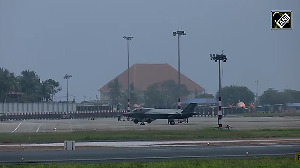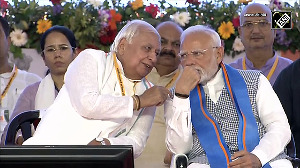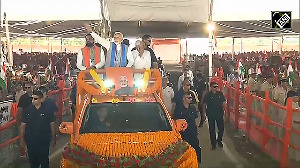The sanctions imposed by developed countries, coupled with lack of political will have deprived India of optimal growth in the nuclear power sector, according to senior nuclear scientists.
If the nuclear power industry has to grow in India, then the sanctions imposed on the country have to be lifted, feel the scientists at the Atomic Energy Department.
It has been known for many decades that India is deficient of uranium and without its availability, the country's nuclear programme will lose its relevance, they said.
"If we do not get access to fuel (uranium), the Pressurised Heavy Water Reactor technologies developed with great success will be of no consequence in the national context," Dr M R Iyer, chairman, Safety Committees for Accelerators of Atomic Energy Regulatory Board, told PTI.
Suddenly waking upto the uranium shortage, politicians began scrambling for indigenous uranium mining as well as importing it from friendly nations.
But the scientists feel that "it is too little too late" since the nation's political leadership is "too afraid to approach non-Nuclear Suppliers Group uranium suppliers to meet the deficit."
Over the restrictions on importing nuclear technology, Iyer said, "Most of the research and development going on in our nuclear establishments is centered around import substitution and inventing the wheel again and again due to embargoes.
This precious manpower can be diverted to develop frontline technologies if the embargoes are removed through various instruments of negotiations," Iyer, former head at the Radiation Safety Systems Division of Bhabha Atomic Research Centre and International Atomic Energey Agency inspector said.
Due to embargoes, many of the technologies that have been developed have not achieved economic viability or perfection and the targets have not been met, he said.
Although India began its atomic programme ahead of many countries, "we have missed most of our targets due to the backlash of the embargoes," Iyer said.
The scientists at the DAE noted that even Dr Homi Bhabha, the founder of India's nuclear programme and one of the founding members of IAEA, himself began the nuclear power programme in the country by importing boiling water reactors from the US and pressurised heavy water reactors from Canada.
As has been pointed out by many, the separation of civilian and strategic facilities in the Indian Atomic Energy programme is in itself very complicated if not impossible since the two are intertwined under the way in which these have evolved.
However, separation has been used as a criteria under NPT, which may allow exemption for civilian facility, some DAE scientists said on condition of anonymity.
Even so, India will benefit by import of many items considered to be of "dual use" under various technology control regimes.
Unfortunately, "dual use" items will remain unavailable to India with negotiations currently under progress, they said.
The removal of sanctions will also benefit the global nuclear community and the US since the peculiar situation of "reverse sanctions" is still practiced within the DAE, the scientists added.
If import of "dual use" equipment are freely available, "reverse sanctions" which are largely directed at the US will lso be no longer necessary, they pointed out.
"This is because the US has an ever increasing and often whimsical list of items classified as dual use serving as a deterrent in trade with that country," scientists said.
India has found that without any obvious rationale for classification of dual use items, it is much easier to buy them in international markets while excluding the US, which has served the country well for the most part but created a negative environment whenever dealt with the US.
If the basis for sanctions and "reverse sanctions" can be removed, both countries would benefit immensely through bilateral trade and relations will improve.






